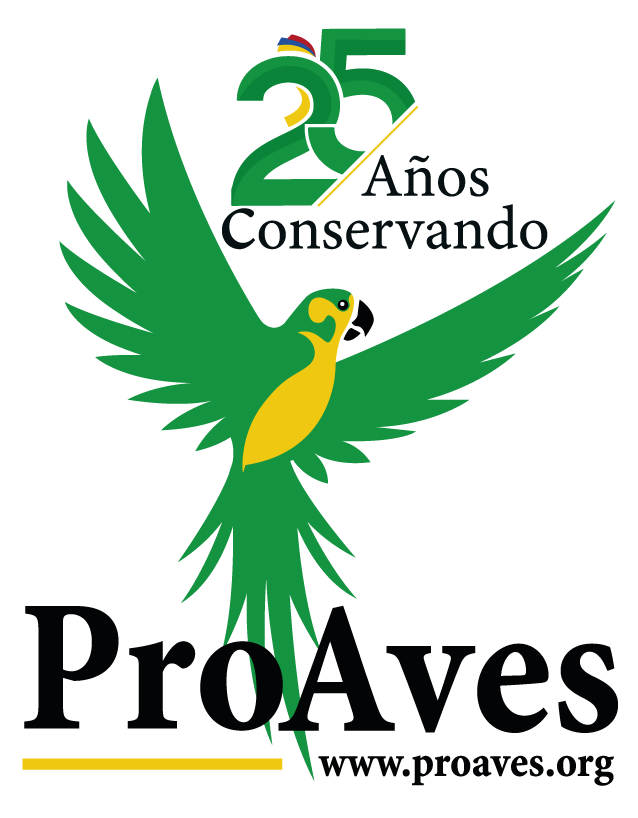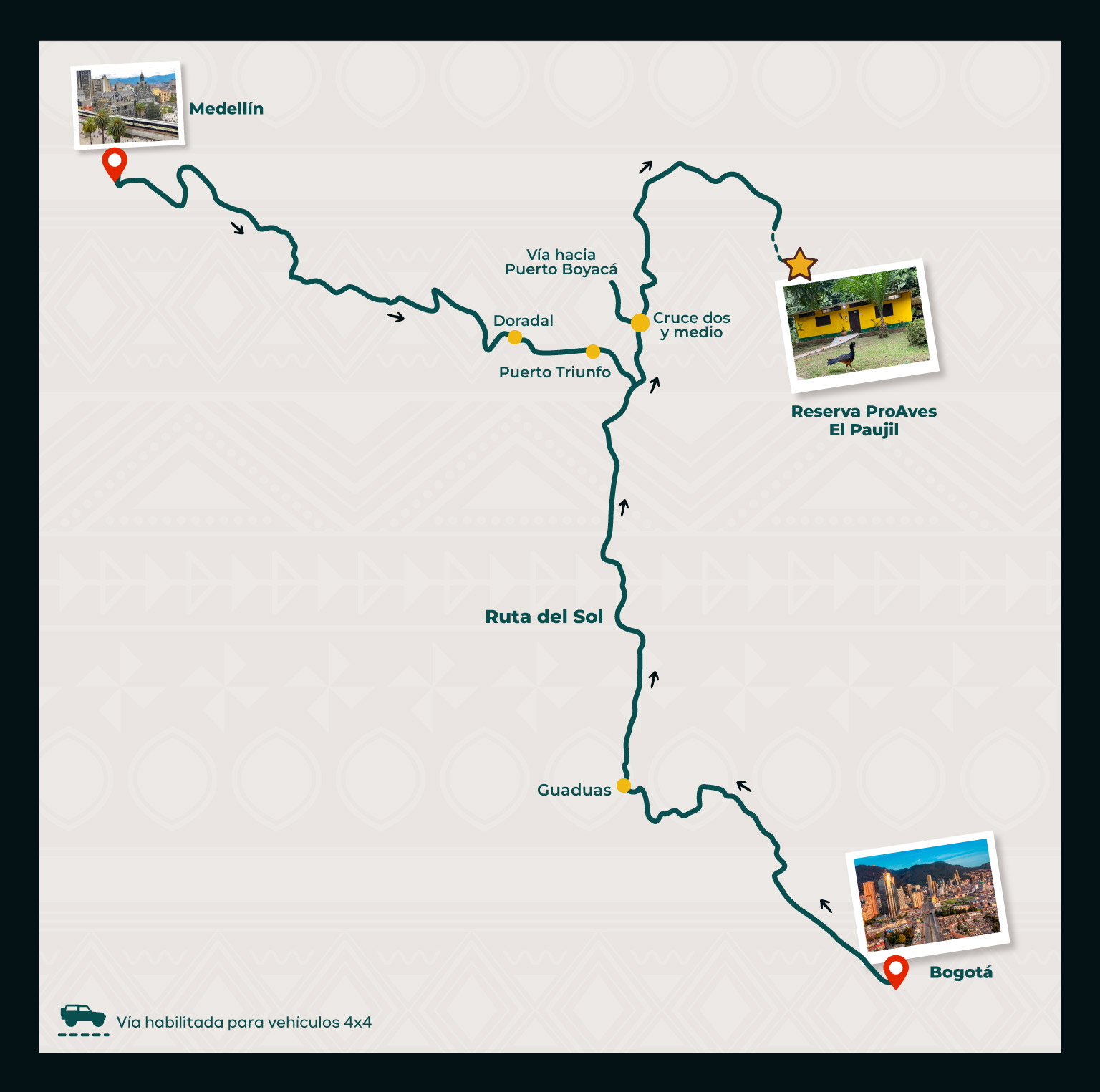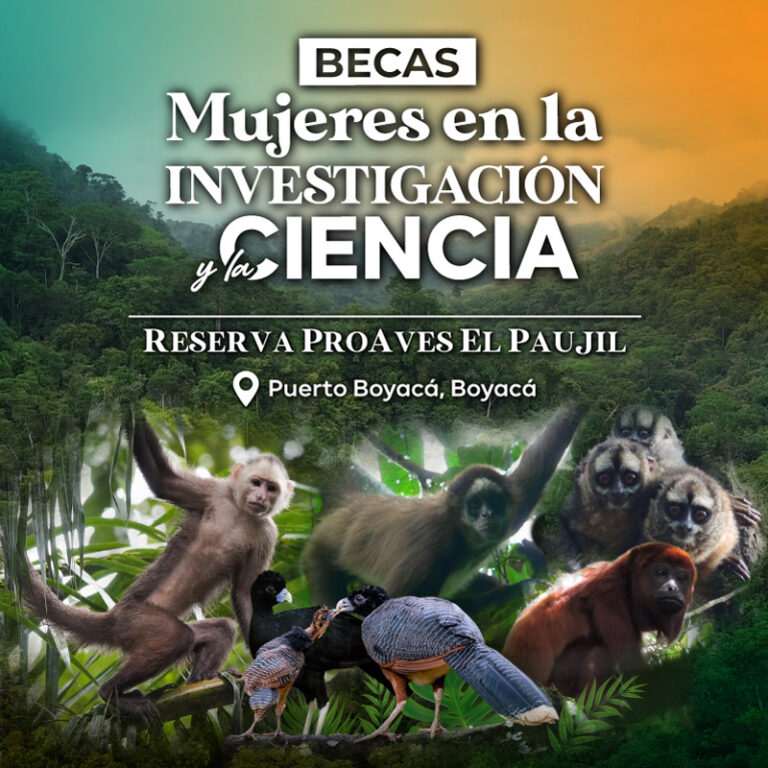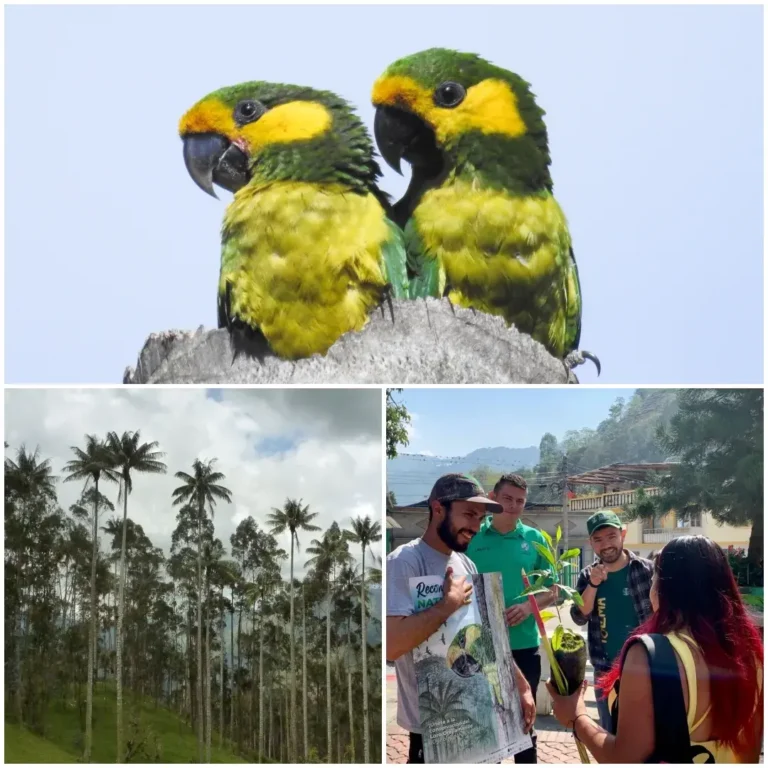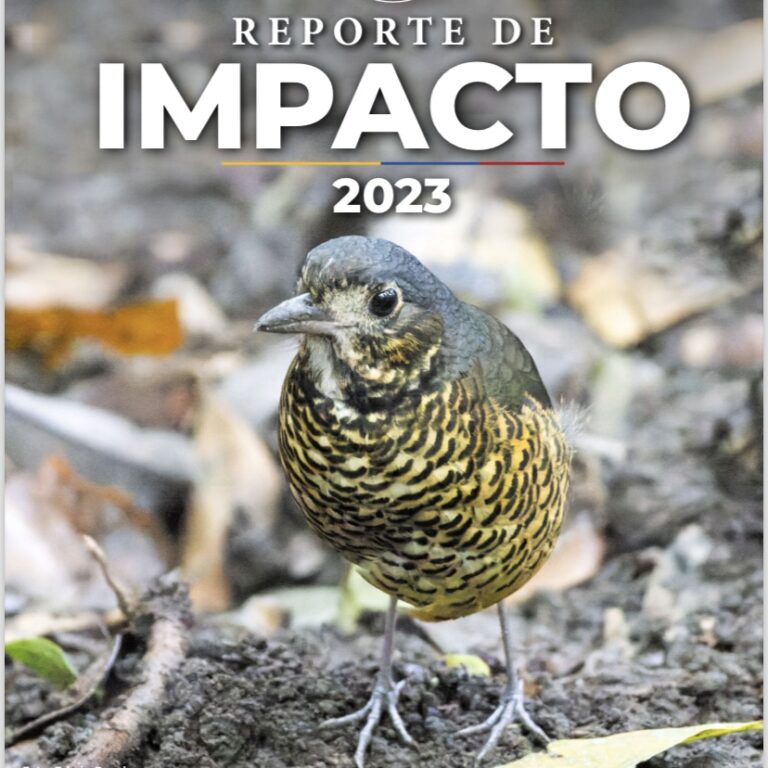Fundación ProAves – por la conservación en el país de las aves

In El Paujil Nature Reserve you can connect with nature and its wonderful species of flora and fauna. This Nature Reserve is home to 394 species of birds, 32 species of amphibians, 46 of reptiles and 43 species of non-flying mammals, and was created to preserve the Blue-billed Curassow (Crax alberti) which is endemic to Colombia and critically endangered. This conservation sanctuary protects one of the most vulnerable ecosystems in Magdalena Medio, the tropical jungle. Without a doubt, an incredible place to know the wonderful biodiversity of Colombia. Visit us!
Fecha de creación:
november
2003
Ecosystem:
Primary and secondary forests little intervened, paddocks and plantations
Temperature:
82 °F

Weather:
Tropical forest, bimodal tetra-seasonal
Altitudinal range:
Between 150 and 1,200 AMSL
KEY SPECIES
En esta área de conservación se han registrado cerca de:
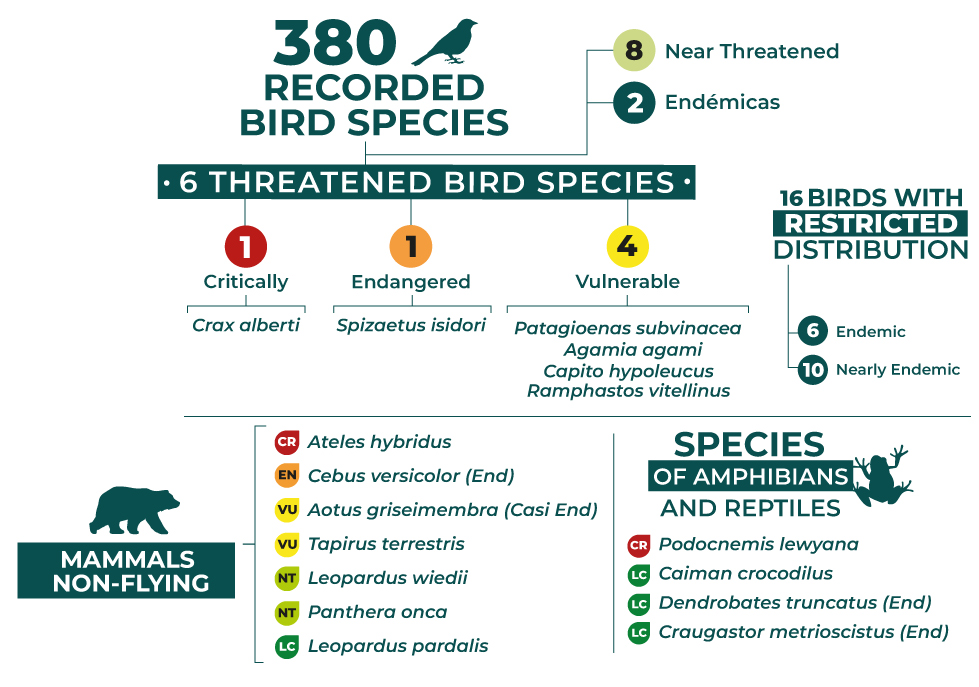
How to get to EL Paujil
You can travel from Ibagué, Bogotá or Medellín to the municipality of Puerto Boyacá, department of Boyacá.
- Public transportation:
You can travel from Ibagué, Bogotá or Medellín to Puerto Boyacá with the companies Brasilia, Rápido Tolima, Los Libertadores or La Reina transport.
Once in the municipality of Puerto Boyacá, look in the market street (one block from the main park) for the Transluzena company’s dispatch site to Puerto Pinzón. The departure times are: 11:00 a.m., 2:00 p.m. and 3:00 p.m. Estimated travel time is 2 to 3 hours.
Throughout the rainy season, you may need our additional luggage service, available at an extra cost. You can request it from local drivers or our park rangers. We’re here to make your visit more comfortable and secure!
- Private transportation:
It is not necessary to go to the municipality of Puerto Boyacá, once at the Dos y Medio crossroads you can take the road to Puerto Pinzón. Approximately 15 minutes after taking this route you will find on the left side a dirt road that leaves the paved road, there is a sign indicating Puerto Pinzón-Pozo 2.
When you arrive at Puerto Pinzón you have several options to get to the reserve: walk for 40 minutes, take a motorcycle cab or take a boat ride on the Ermitaño River. This option depends on the river’s flow depending on the rainy season.
Return: To return is the same process, the transports from Puerto Pinzón to Puerto Boyacá leave at 6:30 am, 7 am and 3 pm and from there in the main park you look for the appropriate route to the city or destination that continues.
The road generally has difficult conditions, so we recommend traveling in 4×4 vehicles.
Approximate travel time: 8 hours from Medellín.
LOCATION
El Paujil ProAves Reserve is located in the village of Puerto Pinzón, municipality of Puerto Boyacá, department of Boyacá.
- Route: Medellín, Bogotá or Ibagué - Road to Puerto Boyacá -Two and a half crossroads - Puerto Pinzón - ProAves Reserve.
VERY IMPORTANT: Do not follow direct Google Maps directions to El Paujil Reserve.
PHOTOGRAPHIC RECORD
The Reserve has accommodation for 12 people with comfortable cabins, with private bathrooms, electricity, drinking and hot water:
things to do
Bird and wildlife
watching
Hikes to the
Caño Cristal waterfall
Nighttime wildlife observation:
mammals, spiders and more
Photograph wild plants
and animals
Birdwatching from
the observation towers
Take an excursion through
the internal trails
Previous slide
Next slide
We recommend a minimum stay of 2- 3 nights to enjoy the activities and variety of wildlife.
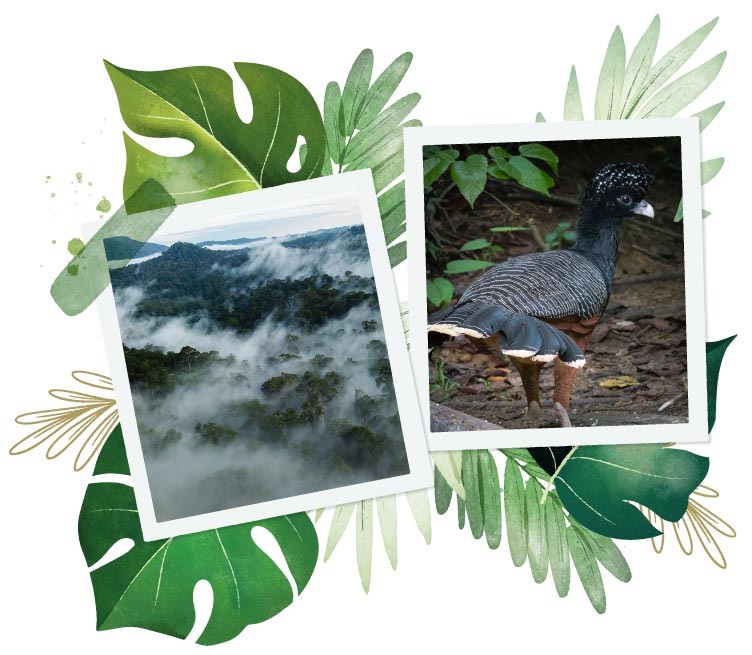
Amenities and services
- Internet access, when is possible
- Water, coffee and tea station
- Bird watching of endemic bird species, feeders as well as different species of mammals and wildlife in general
- Enjoy trails, terraces, and seating areas
- Comfortable rooms
The reservation does not include food or transportation. Any extra service must be requested at the reception and has an additional cost.
PLEASE CONSIDER THE FOLLOWING RECOMMENDATIONS:
RESERVATION
Make your reservation 24 hours in advance.
Walk-in reservations are not guaranteed and are dependent on current availability.
CHECK IN AND CHECK OUT
The ProAves Reserve opens at 6:00 a.m. and closes at 8:00 p.m.
Time of entry to your room: From 3:00 p.m. and time of departure from your room: Maximum at 10:00 a.m.
RESERVATION POLICIES
You can change the dates of the reservation, as long as there is availability.
Changes must be requested in writing and 15 days in advance. No refund is made for cancellation.
MEALS
Inform us of any health problems, allergies, or food requirements.
We will offer you a special menu according to your diet.
DO NOT COLLECT
Please, respect the natural resources of the Nature Reserve. The collection of any biological material is not allowed.
TRANSPORT
It’s necessary to travel in a 4×4 vehicle adapted to handle the conditions of some sections of the road.
CLOTHING
Remember that the climate in Colombia can be very unpredictable! We recommend you bring suitable walking shoes, a rain jacket, long-sleeved clothing, a sun hat, and sunscreen.
FLASHLIGHT
In the Natural Reserve there may be power outages, so bring a flashlight and enjoy connecting with nature without the distraction of modern technology.
MOSQUITOES
You do not need a yellow fever vaccine. However, we recommend using repellent since being in contact with nature there may be mosquitoes.
FORBIDDEN TO ENTER ALCOHOL
The entry of alcoholic beverages into the Nature Reserve is forbidden.
INTERNAL TRAILS
Follow the instructions of the Nature Reserve staff and stay on the established trails.
El Paujil
SUSTAINABILITY & CONSERVATION
El Paujil ProAves Reserve was created in November 2003 to preserve the Blue-billed Curassow (Crax alberti), endemic to Colombia and critically endangered, with the support of American Bird Conservancy (ABC) and Global Conservation Fund (GCF) while also ensuring the preservation of one of the most vulnerable ecosystems which had been circulated in the Middle Magdalena valley, the rain forest.
There has been about 360 species of birds registered in the reserve, 7 of which are endemic species, 8 threatened near-endemic and 8 threatened, 43 non-flying mammal species of which 18 are threatened, 24 species of flying mammals, 32 species of amphibians 1 of which is threatened and 46 species of reptiles. It also highlights: the Cotorra cabeciamarilla (Gypopsitta pyrilia), Carpintero bonito (Melanerpes pulcher), White-Mantled Barbet (Capito hypoleucus), Tiranuelo antioqueño (Phylloscartes lanyoni), Habia ceniza (Habia gutturalis), Mielero turqueza (Dacnis hartlaubi) Mono araña del Magdalena (Ateles hybridus), el Oso andino (Tremarctos ornatus) y Nutria del Magdalena (Pteronura longicauda), among others.
